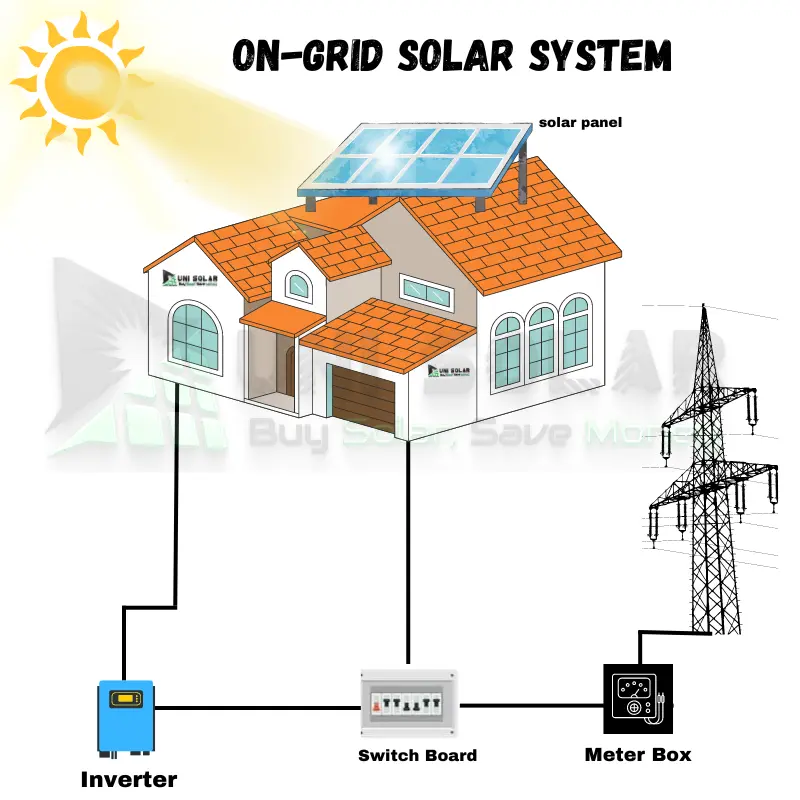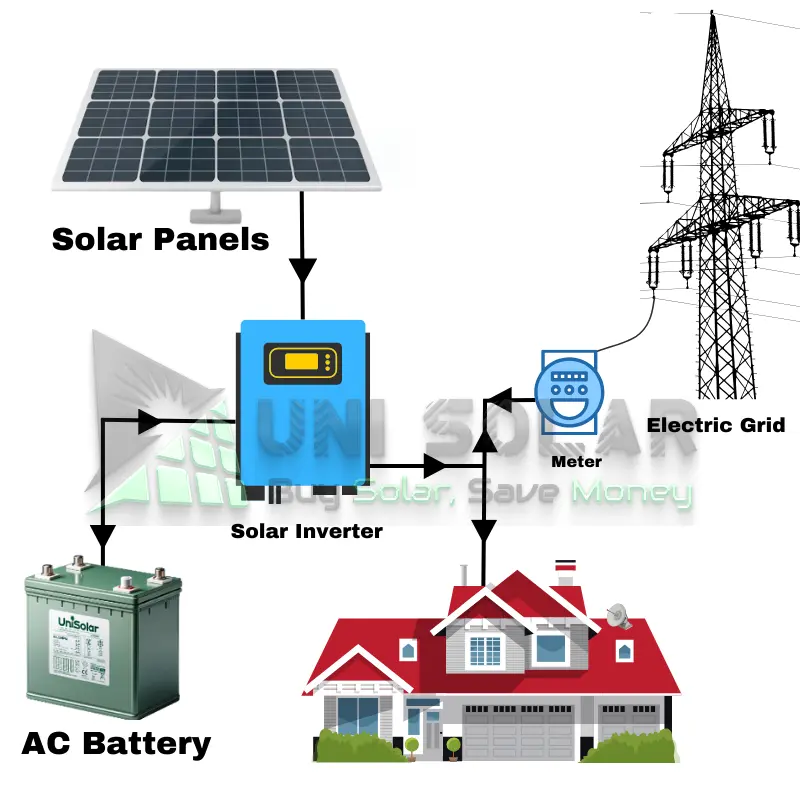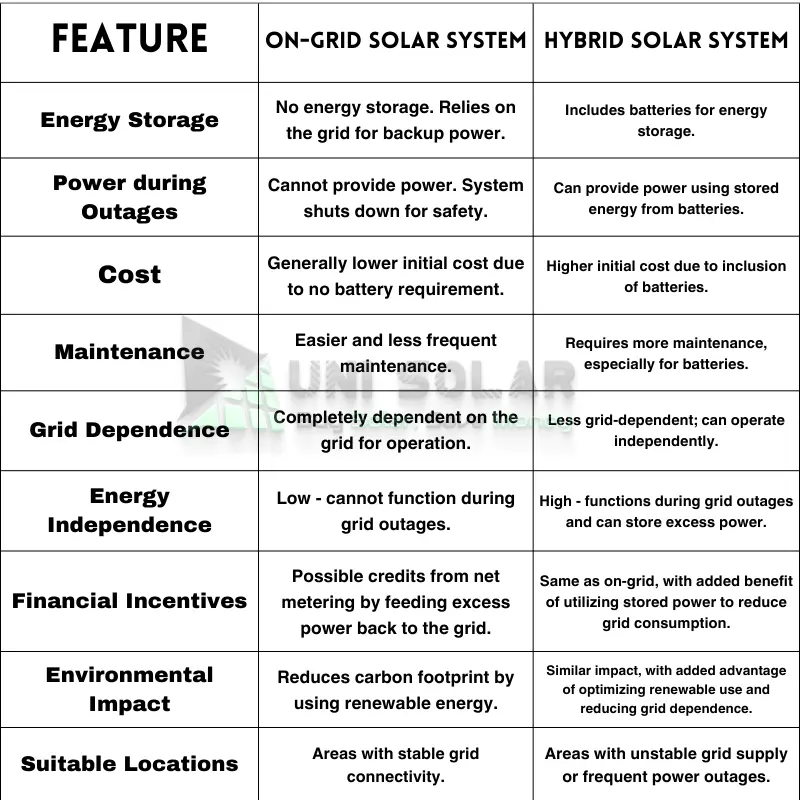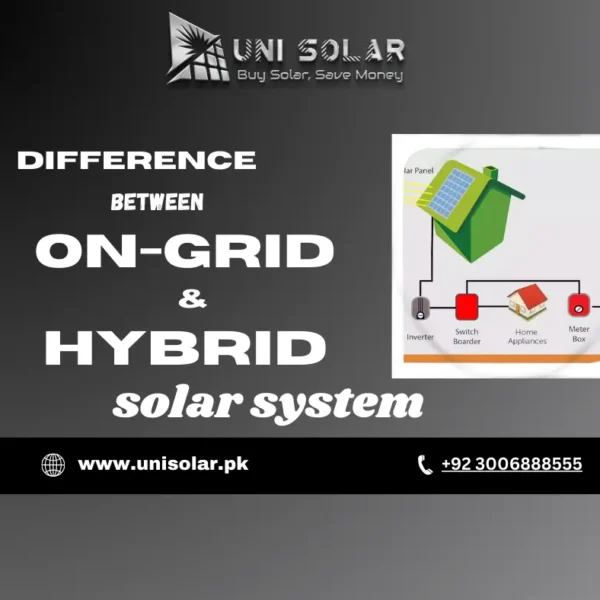Difference Between On-Grid and Hybrid Solar System
Understanding the difference between on-grid and hybrid solar systems in Pakistan is essential for both businesses and homeowners looking for sustainable energy options in Pakistan. An attractive and substantial alternative to the nation’s traditional power sources is solar energy, which is a clean and sustainable resource. This article makes an effort to comprehend the subtleties of the on-grid & hybrid solar system, one of the two widely used solar energy setup options in Pakistan. It aims to provide more detail on their benefits, drawbacks, and operational procedures to help prospective users make an informed choice that takes into account Pakistan’s unique environmental setting and energy requirements.
On-Grid Solar System

One common option for utilizing solar power to generate energy is an on-grid solar system. To put it simply, this system is directly connected to the public power grid. The reality that an off-grid solar system doesn’t need energy storage, like batteries, is one of its key advantages. This is necessary so that the grid can receive any excess energy the solar panels produce. In exchange, electricity is taken from the grid during times when the solar panels aren’t producing enough power, such as at night.
This system works well in locations with reliable grid electricity. Compared to other varieties, on-grid solar systems are less expensive and require less maintenance because they do not include energy storage equipment. The system’s automated shut-off for safety reasons means that it cannot provide electricity during a power outage, which is a drawback. The purpose of this feature is to safeguard utility employees who may be fixing the system.
Installing an on-grid solar system can result in a large reduction in electricity costs. This is because when extra energy is transferred to the grid, the electricity meter reads backward, crediting the system owner. We call this procedure net metering.
Hybrid Solar System
Hybrid solar system is the other kind of solar system that combines the advantages of both on-grid and off-grid solar systems, making it a flexible and effective way to generate electricity. The ability for energy storage is a traditional element of a hybrid solar system. In contrast to off-grid systems, which only depend on the grid for redundancy, hybrid systems store extra power in batteries.
It also means that excess energy produced by your solar panels is not wasted when it exceeds your needs. It is stored in the system’s batteries until it is needed. That is especially useful at night or during a power outage. The stored energy can be used to meet the entire household’s electrical needs if the sun is not present.
Flexibility is an additional benefit. Because of this, the electricity system can now run independently of the grid, which would have been extremely unstable otherwise. That would imply that a hybrid system has the added benefit of being able to continue supplying power in the event of a grid outage. Even in locations that have sufficient grid power.
As on-grid systems, hybrid systems might also be able to pump excess electricity back into the grid. Since the extra electricity that is available can be sold back to an electrical service provider, there is a chance that electricity bills will be reduced.

Benefits of Both On-grid and hybrid solar systems
On-grid and hybrid solar systems both have advantages that are unique to them.
On-Grid Solar System:
Cost-effective: Since the systems don’t need batteries for storage, they are typically less expensive.
Simple Maintenance: It’s simple to maintain battery-less systems.
Accumulate Credits: When using net metering, excess electricity produced can be fed back into the system to offset electricity costs.
Hybrid Solar System:
Energy Storage: When combined with batteries, extra electricity can be kept in reserve and used when the sun doesn’t shine.
Power during Outages: They can provide power even when the grid is down, which ensures greater energy security than on-grid systems.
Energy Independence: They provide greater autonomy from the grid, which is helpful in areas with unstable and irregular power supplies.
Flexibility: Because hybrid systems can use stored energy, draw power from the grid, or give back excess energy to the grid, they offer the best of both worlds.
Comparison Table Of On-Grid vs Hybrid Solar System


